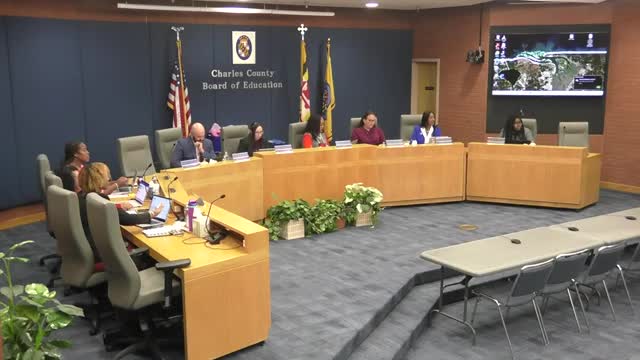Charles County educators press board to slow rollout of mandated collaborative planning
Get AI-powered insights, summaries, and transcripts
Subscribe
Summary
Teachers, union leaders and school principals at the Oct. 14 Board of Education meeting said a systemwide push for frequent, documented collaborative planning is increasing paperwork and unpaid work time and asked the district to pause, reassess and simplify implementation.
Teachers, union leaders and principals told the Charles County Board of Education on Oct. 14 that a rapid, centralized push to require collaborative planning across the school system has added substantial time burdens and paperwork for classroom teachers and building leaders.
The complaint, raised by Sean Heil, president of the Education Association of Charles County (EACC), and echoed throughout the meeting by classroom teachers and principals, focused on the logistics of implementation: required daily or weekly planning blocks, additional documentation and inconsistent partner assignments that leave teachers collaborating with staff outside their content area or grade band.
Why it matters: Educators said the added duties reduce time available for lesson planning, grading and direct instruction and contribute to burnout and attrition. Several speakers asked the district to scale back the paperwork, preserve meaningful planning time and invest in supports, rather than add monitoring and documentation that some described as micromanagement.
Heil presented results of an EACC survey in which 243 members responded; he said about 55% reported benefits from collaborative planning but that 80% identified concerns including time, inconsistent planning partners, and paperwork. “In some cases staff are spending more time documenting their collaborative planning efforts than they do actually collaborating,” Heil said.
Principals and central office staff acknowledged the value of common planning when it works, and district leaders who later addressed the board said they can refine the approach. At the meeting, multiple board members and other speakers urged a pause to evaluate how the requirement is operating in elementary, middle and high schools before further rollout.
Several staff and union representatives suggested remedies including: protecting and honoring existing planning windows rather than redistributing them; shortening documentation requirements to an outcome-focused summary (not a full record of every activity); restoring teacher discretion for how collaborative time is used; and piloting models only where scheduling makes them feasible. Vice chair Cramer and other board members said they supported a reassessment and proposed asking the superintendent for a clearer implementation timeline and a plan to reduce duplicative paperwork.
District officials said human resources, teaching-and-learning and school leadership teams would review where the model has succeeded and where it is creating logistical strain. Nikki Majors, chief human resources officer, and members of the Office of Professional Learning presented the district’s existing supports for new and conditional teachers—mentoring, a Grow Your Own pipeline and National Board supports—and argued these programs are intended to augment, not replace, meaningful planning time.
Ending: Board members said they expect staff to return with specific recommendations and metrics to evaluate collaborative planning. Several said they want evidence the policy is producing improved instruction and not just additional administrative work. "If it is adding work without improving instruction, we need to stop and fix it," a member said.
